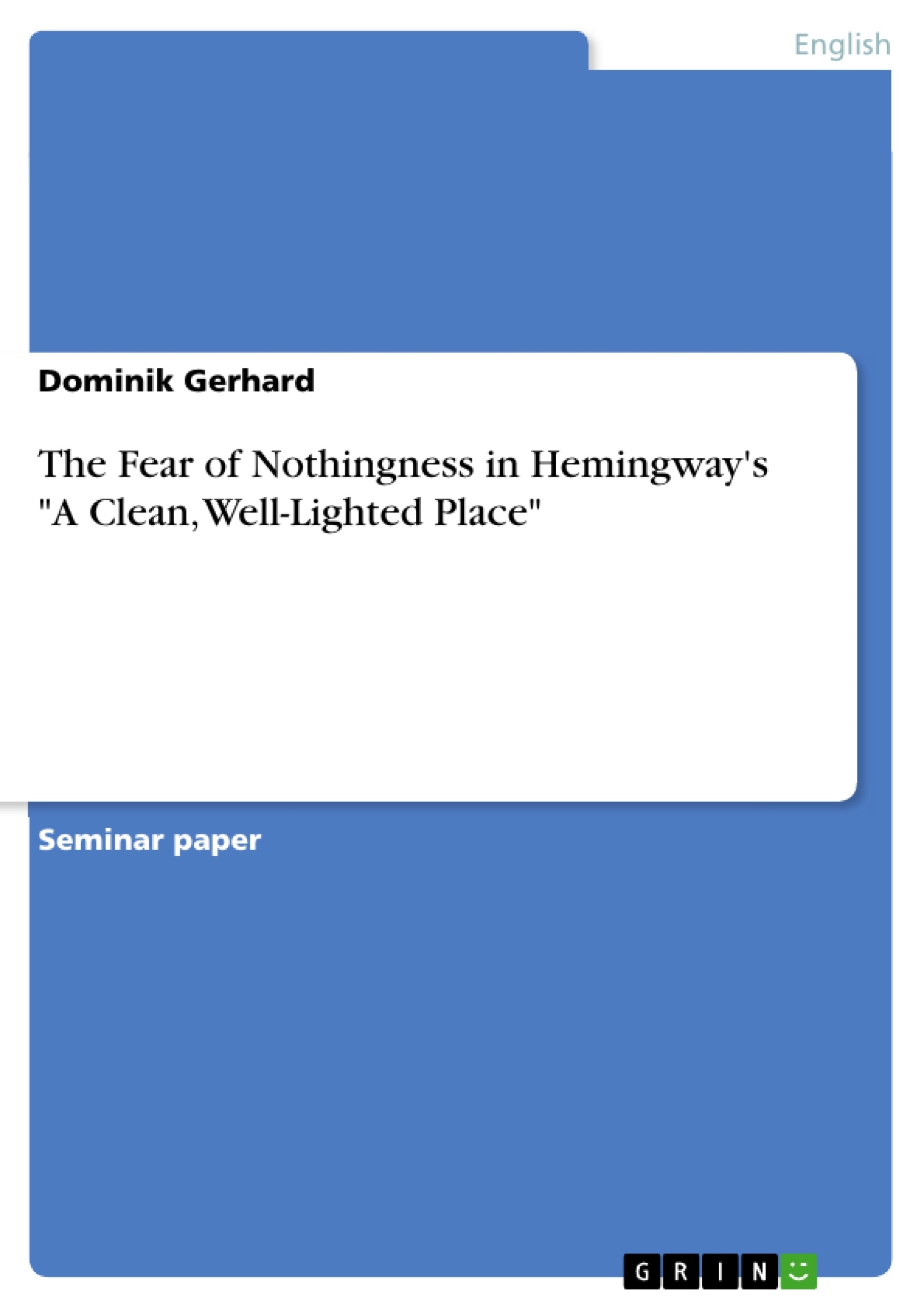In his stylistic masterpiece, “A Clean, Well-Lighted Place,” Ernest Hemingway confronts his readers with the omnipresent fear of nothingness. The main characters of the story show different ways of dealing with that problem, but only the older waiter is able to present a satisfying solution. By establishing a haven for all desperate people who need a dignified place to dispel their fear, the old waiter has found his meaning in life and therefore, his way to combat his fear of nothingness. According to him, life does not need to be senseless and end in despair, as long as one keeps composure and protects one’s own dignity and the dignity of others.
Table of Contents
- I. The Fear of Nothingness in Hemingway's "A Clean, Well-Lighted Place"
Objectives and Key Themes
This analysis aims to explore Ernest Hemingway's "A Clean, Well-Lighted Place" through an existentialist lens, examining how the characters grapple with the fear of nothingness. The analysis focuses on the different coping mechanisms presented in the story and their effectiveness in combating existential anxiety.
- Existentialism and the Fear of Nothingness
- The Role of Symbols (Light and Darkness)
- Coping Mechanisms: Illusion, Despair, and Dignity
- Character Analysis: The Younger Waiter, the Old Man, and the Older Waiter
- The Significance of the Clean, Well-Lighted Place
Chapter Summaries
I. The Fear of Nothingness in Hemingway's "A Clean, Well-Lighted Place": This chapter delves into Ernest Hemingway's short story, focusing on the omnipresent theme of the fear of nothingness. It introduces the existentialist framework through which the story is analyzed, highlighting the characters' various responses to this fear. The chapter sets the stage by examining the concept of existential angst and its manifestation in the characters' lives. It introduces the central conflict: the characters' confrontation with the meaninglessness of existence and their attempts to find solace and meaning. The contrasting symbols of light and darkness are introduced as representations of security and the overwhelming fear of nothingness. The chapter lays the groundwork for the detailed character analysis that follows, previewing the distinct approaches each character takes in dealing with their existential dread.
Keywords
Existentialism, fear of nothingness, angst, Hemingway, "A Clean, Well-Lighted Place," light and darkness symbolism, coping mechanisms, character analysis, dignity, illusion, despair, suicide.
Frequently Asked Questions: Hemingway's "A Clean, Well-Lighted Place" Analysis
What is the main focus of this analysis?
This analysis examines Ernest Hemingway's short story, "A Clean, Well-Lighted Place," through an existentialist lens. It explores how the characters in the story grapple with the fear of nothingness and the different coping mechanisms they employ.
What are the key themes explored in the analysis?
The key themes include existentialism and the fear of nothingness, the symbolism of light and darkness, various coping mechanisms (illusion, despair, and dignity), character analysis of the three waiters, and the significance of the "clean, well-lighted place" itself.
What are the objectives of this analysis?
The analysis aims to understand how Hemingway portrays the existential anxieties of his characters and how they attempt to find meaning in a seemingly meaningless world. It explores the effectiveness of their coping strategies and the underlying philosophical implications of the story.
How does the analysis approach the story?
The analysis uses an existentialist framework to interpret the characters' actions, motivations, and emotional states. It examines the story's symbolism and the characters' responses to the pervasive theme of the fear of nothingness.
What are the major symbols used in the story, according to this analysis?
The primary symbols are light and darkness, representing security and the fear of nothingness respectively. These symbols are analyzed to understand their role in conveying the characters' emotional states and existential struggles.
What coping mechanisms are discussed in relation to the characters?
The analysis examines various coping mechanisms, including illusion, despair, and dignity, as employed by the characters to deal with their existential anxieties. The effectiveness of each mechanism is evaluated within the context of the story.
Which characters are analyzed in detail?
The analysis includes a detailed character analysis focusing on the younger waiter, the old man, and the older waiter, highlighting their individual approaches to confronting the fear of nothingness.
What is the significance of the "clean, well-lighted place"?
The analysis explores the symbolic importance of the "clean, well-lighted place" as a representation of order, security, and a refuge from the overwhelming sense of nothingness that pervades the story.
What are the key words associated with this analysis?
Key words include Existentialism, fear of nothingness, angst, Hemingway, "A Clean, Well-Lighted Place," light and darkness symbolism, coping mechanisms, character analysis, dignity, illusion, despair, and suicide.
What is included in the chapter summaries?
The chapter summaries provide a detailed overview of the main arguments and interpretations presented in the analysis, focusing on the exploration of existential themes within Hemingway's story. It previews the main points covered in the full analysis.
- Quote paper
- Dominik Gerhard (Author), 2008, The Fear of Nothingness in Hemingway's "A Clean, Well-Lighted Place", Munich, GRIN Verlag, https://www.grin.com/document/92405



